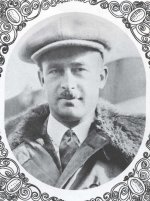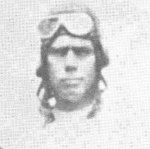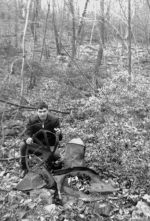|
Tromping through the
woods of Nittany Mountains in central Pennsylvania,
two deer hunters come across a stone memorial. Sweeping
away the brush and dried leaves they see the following
inscription: Charles H. Ames, U.S. Air Mail Service
Crashed Here October 1, 1925.
"Who was this man?"
one of them asks. "Why a memorial stone in such
a remote place?"
His curiosity piqued,
the hunter researches the name. At the local library
he learns that Charles Ames was an airmail pilot
with the U.S. Air Mail Service. Attempting to land
in Bellefonte, PA, on the New York to Cleveland
run, he crashed and died at this spot.
Miles away another
stone memorial commemorates the life of yet another
airmail pilot brought down by the harsh flying conditions
of the Pennsylvania Mountains, appropriately called
the Hell Stretch. His stone reads: Lt. Charles W.
Lamborn, U.S.
Airmail Service Crashed Here July 19, 1919.
 Should
the hunter inquire further he will learn the name
of the man responsible for marking the locations
where two airmail pilots lost their lives. He is
Daniel Lucas, and he lives nearby in Mingoville,
Pennsylvania. Should
the hunter inquire further he will learn the name
of the man responsible for marking the locations
where two airmail pilots lost their lives. He is
Daniel Lucas, and he lives nearby in Mingoville,
Pennsylvania.
When Daniel was eleven-years
old his grandfather, Richard Workman, told him about
a brave airmail pilot who had crashed on a foggy
night in the woods behind his home. Intrigued by
the story, Daniel and his brother combed the woods
searching for the site but failed to find it.
The years passed.
Then in 1970, Dr. William Cleveland, of Cleveland,
Ohio, contacted Daniel. Cleveland had erected a
memorial stone to commemorate his brother Jimmy
who crashed into the side of Nittany Mountain in
1931, and he wanted to find the Ames site.
Daniel was happy to
oblige. He enlisted the help of his grandfather,
now aged, to show him the spot. Together they ambled
up the mountain to an unmarked area on the map called
Ames Pass. While his grandfather lagged behind,
Daniel took a short cut and found plane parts lying
on the ground. Eventually, he discovered the engine
guard and knew he’d chanced upon the site. To mark
the spot, he began building a stone cairn, adding
to it each time he returned. He also marked the
location with a circle of white painted stones so
 it could be seen from the air.
it could be seen from the air.
By 1983, the cairn
extended higher than he could reach.
Time went by. Upon
returning to the site in 1990, he discovered that
someone, possibly kids, had knocked the stones over.
This wouldn’t do. Daniel determined to erect a permanent
marker.
He
contacted Mayes Memorial in Lemont, PA. Yes, they
would contribute the memorial stone.
Now came the hard
part. To pour a concrete foundation for the marker,
he carried 80 pounds of cement and gallons of water
hundreds of yards up the steep mountainside. Then
he lugged an 87-pound, 18 X 10 X 4-inch gray granite
marker to the slab.
Finally, on October
1, 1991, 66 years after Ames crashed, Daniel Lucas
cemented the stone memorial in place.
"I decided if I marked
Ames, I might as well mark Lamborn (the first pilot
to die in the Hell Stretch) because that’s another
crash site that would be lost forever." Mayes donated
that stone too.
And so Daniel Lucas
realized a life-long dream to mark history.
|

